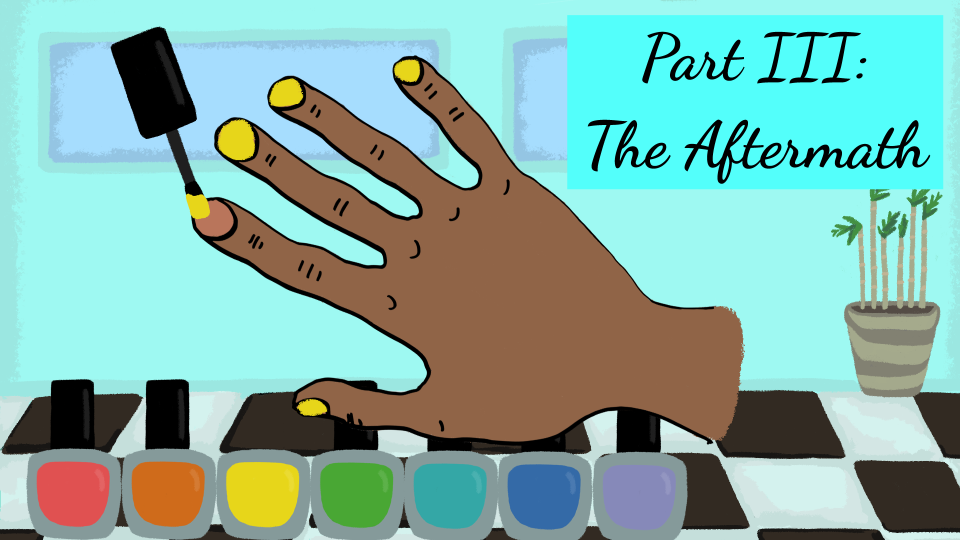
This series of posts recounts the development of I WILL MAKE YOU A BETTER PERSON, a research-creation process talk presented at CGSA 2019. For this project, we began with the idea that we might be able to teach each other valuable game design skills without putting undue pressure on one another. Our collaborative process ended with revelations about the powers of group care, quitting, and nail salons. In our last post, we discussed the development process of our game Polished and how we managed non-hierarchical workflow and maintaining our core social dynamics. In this final post, we go over presenting our project at CGSA in Vancouver and what we learned at the conference.
Six months after the three of us first joined together, it was finally time to show what we’d done. When we first applied to the Canadian Game Studies Association conference, we had such a loose conception of what we were doing that our reviewers didn’t really know how to evaluate our proposal. And throughout our process, we constantly reminded ourselves that even if we managed to complete nothing, we could still go to the conference and talk for an hour about that failure. But while we hadn’t failed, we still wanted to spend our hour talking about everything we had done and experienced and felt and how that had changed us. Even though we showed up with a silly game about nail polish, we were not there to talk at length about the salon experience. Our session was decidedly about three things: marginalization, burnout, and the power of group care.
To our (welcome) surprise, these themes were also being embraced and addressed by other CGSA presenters. Kara Stone gave a presentation about #SelfCare (an app touching on depression and debility) and how our dichotomous categorisations of “healthy” and “ill” create unreasonable conditions for hard reduction that self-care frameworks can address. In talking about online communities and literacy in play, Rainforest Scully-Blaker extensively discussed the concept of communities of care, a theoretical signpost for something we realized we’d been building all along. Emma Vossen spoke about her experiences as a professor dealing with harassment from alt-right students (DM her for a video link), echoing a similar talk given by Bonnie Ruberg at this year’s Game Developers Conference. Finally, some of us attended a workshop titled “A Field of our Own: Toward a Millennial Feminist Game Studies”, in which we teamed up in groups to redesign our own versions of the “Monopoly for Millennials” board game, which ended up being a smaller-scale version of the same cathartic game design process we went through in creating Polished. These types of revelations persisted even after the conference ended, as the #CGSA2019 hashtag on Twitter led to amazing conversations about the righteous power of quitting, and related issues of decolonization that sprang out of our session’s explicit critiques of the academy as an institution.
All in all, our time at the conference was not only enlightening, but powerful and healing as well. We closed our talk as we’ll close this series of posts, by pointing towards where we’re each at now personally and professionally and how the process of our group project helped us get there and understand ourselves a bit better.
For Rebecca, the Polished project helped her realize what she really cared about – people and creating. While she still needs to finish her degree, Rebecca she also taken the time and space to focus on other creative projects, including a one month game making residency.
Kalervo is moving on to a postdoc at the University of Calgary, but still concerned that academia as a career path has viability issues for him. The mobility required of the field may ultimately be incompatible with his family’s need to stay in Montreal. A reckoning is coming. But regardless of what happens there, the skills he picked up in game development have opened up any number of new pathways for him as well.
As for Squinky, they have officially quit grad school and are much happier for it. In the short term, they are returning to freelance work, as well as continuing to work on game projects that spark joy. In the longer term, inspired in part by working on I WILL MAKE YOU A BETTER PERSON, they hope to form a worker co-op with other game developers looking to collaborate in a non-hierarchical way while creating a community of care in the process.
